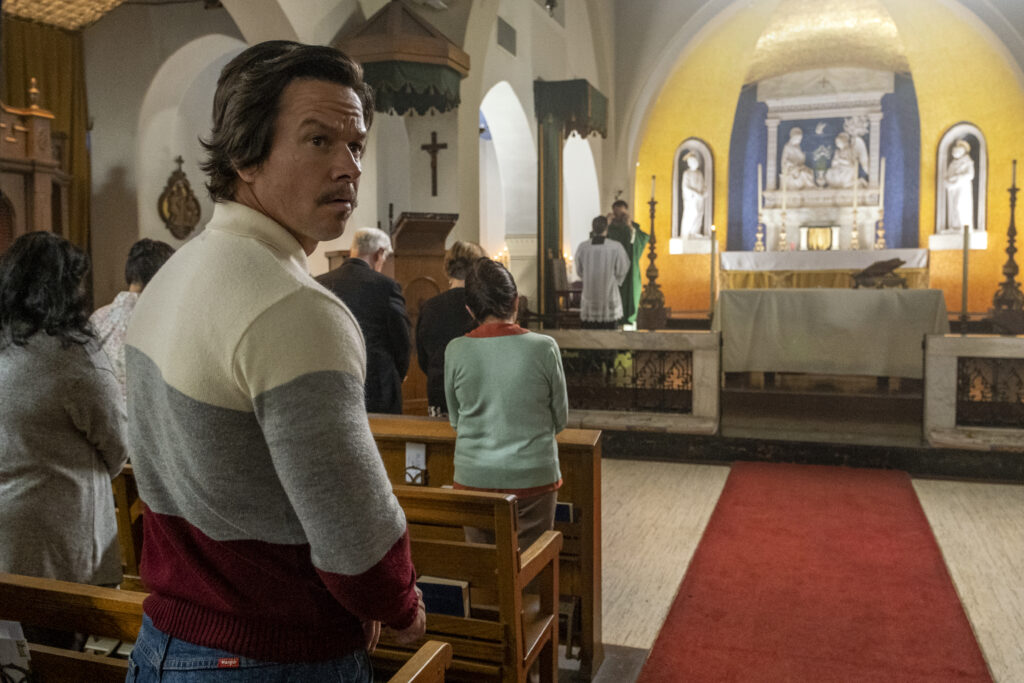December 1, 2022
by Carla Hay

Directed by Antonie Fuqua
Some language in French with subtitles
Culture Representation: Taking place in Louisiana in 1863, the dramatic film “Emancipation” features a cast of African American and white characters representing the working-class, middle-class and wealthy.
Culture Clash: After the Emancipation Proclamation frees enslaved people in the United States, a formerly enslaved African American man goes on a harrowing journey trying to escape from enslavers who still want to keep him and other people in captivity.
Culture Audience: “Emancipation” will appeal primarily to people who are fans of star Will Smith and anyone interested in watching an intense Civil War drama inspired by a real person.

Will Smith gives one of the most emotionally raw performances of his career in “Emancipation,” an intense drama that shows the abuse endured by a formerly enslaved man fighting for freedom and his family during the U.S. Civil War. Most people who see “Emancipation” will know in advance that it’s a movie that depicts human enslavement and the brutality that comes with this crime. And many people watching “Emancipation” might have seen other films or TV shows covering the same subject matter in detailed ways. However, even with that prior knowledge, viewers will feel the potent impact of “Emancipation,” not just as a movie about the Civil War era but also as an inspirational survival story in the midst of cruel human-rights violations.
Directed by Antoine Fuqua, “Emancipation” is inspired by a formerly enslaved African American man only known as Gordon, who was photographed for the media in 1863, while he was undergoing a medical exam as a soldier in the Union Army during the Civil War. A photo of a shirtless Gordon showing his back covered with massive whip scars (that are so large, they look like tree branches) garnered him the nickname “Whipped Peter,” when the photos were published in Harper’s Weekly. The “scourged back” photo is credited with spreading more awareness about the atrocities of slavery and increasing the movement for the Union Army to defeat the pro-slavery Confederate Army in the U.S. Civil War.
Gordon’s life story is only known in bits and pieces. Therefore, much of “Emancipation” (whose screenplay was written by Bill Collage) is fictional but inspired by Gordon’s real story and real events that happened during the Civil War. He is given the name Peter in the movie “Emancipation,” which takes place in 1863 in Louisiana, and begins shortly after President Abraham Lincoln issued the Emancipation Proclamation on January 1, 1863. This federal decree banned slavery in the U.S. and legally declared that all enslaved people in the U.S. were automatically free.
Of course, the people who depended on enslavement for their businesses did not want enslaved people to know about the Emancipation Proclamation. “Emancipation” depicts this societal problem where parts of the U.S. that sided with the Confederate Army and wanted to secede from the U.S. also refused to abide by the Emancipation Proclamation because they did not consider it a valid government decree. “Emancipation” shows in often-disturbing details how formerly enslaved people were caught in this crossfire.
The opening scene of “Emancipation” shows Peter (played by Smith) in a seemingly tranquil family setting. He’s washing the feet of his beloved wife Dodienne (played by Charmaine Bingwa), while their four children are nearby in the room. Their children’s ages range from about 5 years old to 14 years old. The children are daughter Betsy (played by Imani Pullum), who’s the eldest child; son Scipion (played by Jeremiah Friedlander); son Peter (played by Landon Chase Dubois), nicknamed Little Peter; and daughter Laurette (played by Jordyn McIntosh).
Peter and Dodienne are originally from Haiti, so they know what it was like to be free people before being unwillingly brought to the U.S. as enslaved people. They are very religious and believe in the power of prayer. In the opening scene where Peter is with his family, he says, “What can a mere man do to me? The Lord is with me. He is my strength and my defense. He has become my salvation.”
The family will soon have their inner strength severely tested when Peter is forced to relocate to another plantation in Clinton, Louisiana. He tries to fight back in self-defense, but he’s outnumbered and assaulted for defending himself. Peter’s wife and kids are helpless and sobbing as Peter is taken away.
During the ride to the labor camp, Peter and the other men who are with him see the heads of other African American men gruesomely displayed on tree sticks that line the road. It’s an ominous indication of what can happen to “runners” (people running from enslavement) or any black person who is murdered for whatever reason by a white supremacist racist. Fair warning to sensitive viewers: “Emancipation” has a lot of graphic violence that isn’t exploitative, but it might be too disturbing for some viewers.
One of the criticisms that “Emancipation” might get is that it portrays Peter as “too saintly,” perhaps because Peter is so vocal about his religious beliefs. But anyone with that criticism didn’t pay attention enough to the movie, because Peter actually is no pious pushover, since he doesn’t hesitate to dole out some violence when he absolutely has to do so in self-defense. The movie also shows how Peter’s experiences change him over time: He doesn’t lose his humanity, but he becomes hardened and reaches low points of utter despair.
Peter has been taken to a plantation owned by the cold-hearted Jim Fassell (played by Ben Foster), who inherited the property from his widowed father. One of the men who arrived in the same group as Peter is named Tomas (played by Jabbar Lewis), who is forcibly branded on his face with the letter “J” (for Jim), as Peter and the other enslaved men nearby watch in horror. Jim is described by one of the men as “one of the biggest hunters, day or night.” And the prey that Jim hunts is human.
At first, Peter tries to be as religiously optimistic as possible, even when the captured men around him have lost faith in a higher power and think Peter is being too naïve or downright delusional. When Peter finds out from Tomas that Tomas doesn’t have any family members or friends to think of in rough times, Peter gives this over-simplistic advice: “Then remember, this is just work. God is with us.”
One day, Peter overhears one of Jim’s sadistic employees named Howard (played by Steven Ogg) tell another employee that Abraham Lincoln has freed the enslaved people of America. Peter then sets a plan in motion to escape with some other formerly enslaved men to Baton Rouge, Louisiana, where he knows there are Union Army troops. It isn’t long before the word gets out about the Emancipation Proclamation, leading to formerly enslaved people on Jim’s plantation to engage in a massive uprising and escape.
Peter runs into the swampy woods with three younger men in their 20s: Tomas, John (played by Michael Luwoye) and Gordon (played by Gilbert Owuor). Jim and two sidekicks are in pursuit on horseback with two attack dogs. Jim’s lackeys are a sleazebag named Harrington (played by Ronnie Gene Blevins) and a traitorous African American named Knowls (played by Aaron Moten). The rest of “Emancipation” shows what happens during this terrifying journey.
Robert Richardson’s sweeping cinematography of “Emancipation” has all the markings of an epic war film, but the hues are often awash in gray and brown, as a reflection of this very grim and bleak story. Fuqua’s direction does not let the tension let up as soon as Peter escapes and faces life-or-death situations from humans and wild animals. Smith’s performance as Peter is riveting in expressing heartbreak and hope. It’s not a dialogue-heavy film, because Peter is not very talkative, and while he’s hiding out, he often spends a lot of time alone. However, Smith is able to poignantly express much of the anguish, fear, bravery and faith that define his “Emancipation” character.
As chief antagonist Jim in “Emancipation,” Foster has the most conspicuous of the movie’s supporting roles. Foster does a skillful version of the “evil slave master” villain that’s been seen in many other movies and TV shows about enslavement. There’s a standout scene where Jim describes a childhood memory of his enslaved nanny, and his coldly hateful monologue encapsulates the fear and loathing that white supremacists have about people of other races being treated as equals to white people.
“Emancipation” is not an easy film to watch for a lot of viewers. Some people might also give criticism because they think there are already too many movies and TV shows about the trauma of racist enslavement. However, “Emancipation” is respectful of this serious issue without glossing over the harsh realities, even though some viewers will inevitably complain that this movie from Hollywood filmmakers has Hollywood movie characteristics. It’s not a documentary, but “Emancipation” is a necessary history lesson that gives people an idea of what many other formerly enslaved people in America had to do to survive in a nation coming to terms with its shameful involvement in slavery.
Apple Studios will release “Emancipation” in select U.S. cinemas on December 2, 2022. The movie will premiere on Apple TV+ on December 9, 2022.


